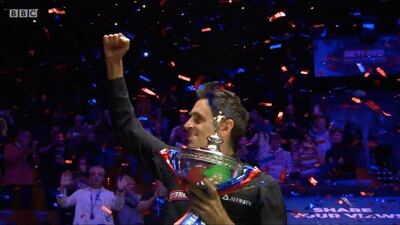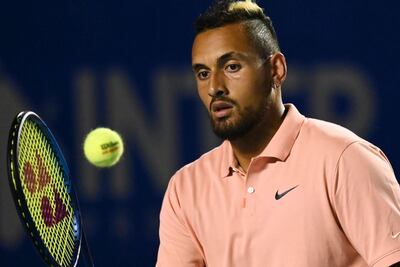Snooker great Ronnie O’Sullivan picked up his sixth World Championship crown on Sunday, but it’s his earlier comments about the sport’s younger generation of players that made bigger headlines.
O’Sullivan gave a brutally honest assessment of young cueists, describing them as “half-decent amateurs” before adding, “not even amateurs, they’re so bad”.
The 44-year-old said he’d probably have to “lose an arm and a leg” to drop out of the top 50, and put down his longevity in the sport to the poor level of his competitors.
The Brit is known for his colourful personality and outspokenness but that degree of honesty is so rare in the world of professional sport, that even those familiar with O’Sullivan’s ways were stunned by his statements.
The video of the BBC interview has received more than 4.5 million views on Twitter alone, and it quickly caught the eye of tennis fans, who drew parallels between what O’Sullivan was saying and the current state of men’s tennis.
Novak Djokovic, Rafael Nadal and Roger Federer – all aged 32 and over (Federer is 39) – are still dominating the game, scooping the tour’s biggest titles and maintaining their place in the world’s top four.
They’ve proven time and time again that they are a class apart, and it’s taking the younger crop of players forever to try to eclipse them, or at least steal a major crown from them. No active player currently under the age of 30 is a men’s singles Grand Slam champion.
Still, no matter how obvious the gap is, one wouldn’t dream of hearing Djokovic, Nadal or Federer give such a scathing description of their peers the way O’Sullivan has done. They might think it, but they would never say it.
A couple of years ago, retired Russian tennis player Marat Safin said it for them.
"Nadal and Federer are still up there because young people are very bad," the fiery Safin told Marca.
While there are exceptions, most professional athletes stick to safe, polished answers instead of truly speaking their mind.
There can be false modesty, fake camaraderie, evasive one-liners, and routine responses that all make for very bland rhetoric, and the truth is, you can’t blame them for it.
Between the court of public opinion passing judgment through social media, their legally binding contracts with their sponsors, and the press, sportsmen and women have a lot to consider before opening their mouths.
Very few athletes can get away with making comments as blunt as O’Sullivan’s. For some reason, the public can accept an honest statement from someone of legendary status within a sport, but wouldn’t take it from someone who hasn’t achieved as much.
Even though honesty is honesty, and it shouldn’t really depend on how much you have won or achieved.
It’s OK for LeBron James to say, “I feel confident because I’m the best player in the world; it’s simple” during the NBA Finals, and it’s acceptable for Cristiano Ronaldo to say, “If we were all at my level, maybe we would be leaders” after a derby loss. It’s not braggy or insensitive when Rory McIlroy scoffs at a $10 million (Dh37m) bonus and says, “that amount of money doesn’t mean much to me anymore”.
But someone like Nick Kyrgios, a supremely talented Australian tennis player who hasn’t necessarily fulfilled his potential, wouldn’t get a pass for telling it like it is.
Kyrgios has had his issues on court, but off court, his candour is a breath of fresh air. He doesn’t shy away from voicing his dislike of some of the other players, and he’s been openly critical of his peers for their reckless behaviour during the ongoing raging pandemic.
In various press conferences, the Australian has shared his mixed feelings towards tennis, and has opened up about his mental struggles and the constant state of homesickness that envelops him while on tour.
It takes a lot of guts these days to be this upfront as a professional athlete, and it’s not without its consequences.
Bernard Tomic, who has had his fair share of troubles and has made questionable moves in the past, gave a raw and honest account of how he felt after a first-round defeat at Wimbledon in 2017.
Tomic said he felt “bored” on court and admitted he doesn’t often give tennis the respect it deserves. He was 24 at the time but said he felt “old” and was burnt out from enjoying early success as a teenager on tour. His racquet sponsor Head dropped him a couple of days later.
WWhen I asked Djokovic, who is also sponsored by Head, if he felt for Tomic, who was simply being honest, the Serb said that he did but that “it’s understandable, in a way, why Head has reacted in this way; because it’s not the right message to send out there from one of the most talented players”.
‘The right message’, that’s what it comes down to.
Athletes often have to choose between showing their true character – which would allow more fans to connect with them but potentially anger some others – and staying on message. It’s great for them if the two choices align.
Unfortunately for them, that’s not usually the case.



